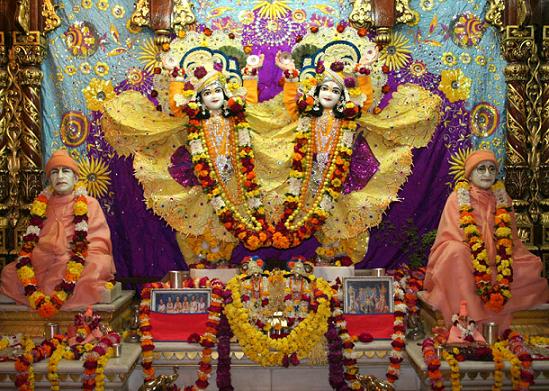"In the Third Chapter of this epic, Srila Krishnadasa Kaviraja Gosvami has explicitly accepted the fact that Krishna appears in this material world at the end of the Dvapara age of the twenty-eighth catur-yuga of Vaivasvata Manu and brings with Him His Vrajadhama, which is the eternal abode of His highest pastimes. As the Lord appears by His own internal potency, so He also brings all His paraphernalia by the same internal potency, without extraneous help. It is further stated here in the Caitanya-caritamrita that the parakiya sentiment exists only in that transcendental realm and nowhere else. This highest form of ecstasy can exist only in the most confidential part of the transcendental world, but by the causeless mercy of the Lord we can have a peep into that invisible Vraja.
"The transcendental mellow relished by the gopis in Vraja is superexcellently featured in Srimati Radharani. Mature assimilation of the transcendental humor of conjugal love is represented by Srimati Radharani, whose feelings are incomprehensible even to the Lord Himself. The intensity of Her loving service is the highest form of ecstasy. No one can surpass Srimati Radharani in relishing the qualities of the Lord through this supreme transcendental mellow. Therefore the Lord Himself agreed to assume the position of Radharani in the form of Lord Sri Gauranga. He then relished the highest position of parakiya-rasa, as exhibited in the transcendental abode of Vraja."
(Sri Caitanya-caritamrita, Adi 4.50, Purport)
.

